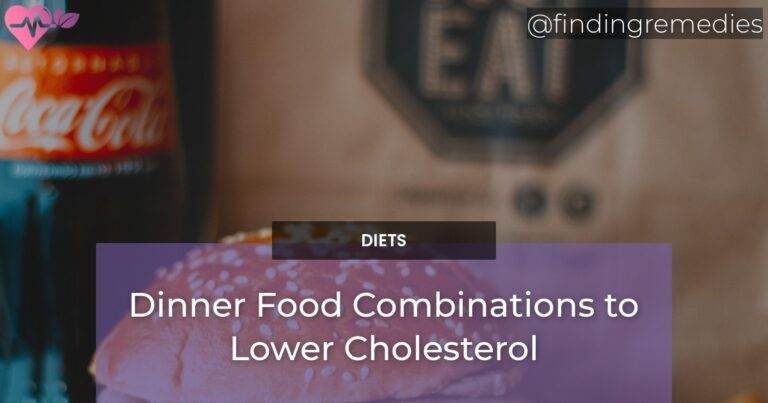Lowering cholesterol levels is an important aspect of maintaining good heart health. While medications and lifestyle changes play a crucial role in managing cholesterol, the right food combinations can also make a significant difference. By incorporating specific foods into your dinner meals, you can help lower your cholesterol levels and improve your overall well-being. In this article, we will explore a variety of dinner food combinations that are not only delicious but also effective in reducing cholesterol.
Dinner Food Combinations to Lower Cholesterol
Incorporate Soluble Fiber and Unsaturated Fats
To effectively lower cholesterol, it is essential to incorporate foods rich in soluble fiber and unsaturated fats into your dinner meals. Soluble fiber helps reduce low-density lipoprotein (LDL) cholesterol, also known as “bad” cholesterol, while unsaturated fats can help increase high-density lipoprotein (HDL) cholesterol, the “good” cholesterol.
High-fiber Vegetables with Avocado or Olive Oil Dressing
Include high-fiber vegetables such as broccoli, Brussels sprouts, and carrots in your dinner. These vegetables are not only packed with essential nutrients but also help lower cholesterol levels. Combine them with a dressing made from avocado or olive oil to add healthy unsaturated fats to your meal.
Whole Grain Bread with Nut Butter or Hummus
Choose whole grain bread as a healthy carbohydrate option, and pair it with nut butter or hummus for a delicious and cholesterol-lowering combination. The whole grain bread provides fiber, while nut butter or hummus adds healthy fats and protein to the meal.
Legumes with Nuts or Seeds
Legumes such as lentils, chickpeas, and beans are excellent sources of soluble fiber and plant-based protein. Combine them with nuts or seeds like almonds, walnuts, or chia seeds to increase the overall fiber and healthy fat content of your dinner.
Boost Antioxidant Intake with Colorful Vegetables
Adding a variety of colorful vegetables to your dinner not only enhances the visual appeal but also boosts your antioxidant intake. Antioxidants help protect your cells from damage and reduce inflammation, contributing to better heart health.
Roasted Bell Peppers with Spinach and Quinoa
Roasted bell peppers are rich in antioxidants and can be combined with nutrient-packed spinach and quinoa. This combination not only adds a burst of flavors to your dinner but also provides a wide array of vitamins, minerals, and fiber.
Broccoli and Cauliflower Stir-Fry with Brown Rice
A stir-fry made with broccoli and cauliflower is not only a quick and easy dinner option but also a great way to incorporate heart-healthy vegetables into your meal. Serve it with brown rice for added fiber and essential nutrients.
Tomato Salad with Basil and Mozzarella
Tomatoes are loaded with antioxidants, particularly lycopene, which has been linked to reducing LDL cholesterol levels. Create a refreshing tomato salad by combining sliced tomatoes with basil and mozzarella, and drizzle it with a light dressing for a nutritious and flavorful dinner.
ALSO READ
Utilize Herbs and Spices for Added Flavor and Health Benefits
Herbs and spices not only enhance the taste of your dinner but also offer numerous health benefits, including cholesterol-lowering properties. Incorporating them into your meals can add a burst of flavor while providing additional antioxidants and anti-inflammatory compounds.
Grilled Salmon with Dill and Lemon
Grilled salmon is a heart-healthy protein rich in omega-3 fatty acids, which can help lower triglyceride levels and reduce the risk of heart disease. Season it with dill and lemon for added flavor and cholesterol-lowering benefits.
Turmeric-Roasted Chicken with Garlic and Ginger
Turmeric is a spice known for its anti-inflammatory properties, and when combined with garlic and ginger, it creates a flavorful and health-promoting dinner option. Roast chicken with these spices for a cholesterol-friendly meal.
Cumin-Spiced Lentils with Coriander
Lentils are a fantastic source of soluble fiber and plant-based protein. When cooked with cumin and coriander, they offer a delightful aromatic experience while providing cholesterol-lowering benefits. Consider making a hearty lentil curry or stew for a satisfying dinner.
Opt for Lean Protein Sources
Choosing lean protein sources for your dinner can help reduce saturated fat intake, which is known to raise cholesterol levels. Incorporate these lean protein options into your meals for a heart-healthy dinner.
Grilled Chicken Breast with Asparagus
Grilled chicken breast is a lean protein choice that pairs well with asparagus, a vegetable rich in fiber and antioxidants. This combination provides a well-rounded dinner that is both satisfying and beneficial for cholesterol management.
Baked Cod with Brussels Sprouts
Cod is a lean fish packed with heart-healthy omega-3 fatty acids. Bake it with Brussels sprouts, which are high in fiber, to create a flavorful and cholesterol-lowering dinner.
Tofu Stir-Fry with Bok Choy
Tofu is a versatile plant-based protein that can be incorporated into a variety of dishes. Stir-fry tofu with bok choy, a nutritious leafy green vegetable, for a cholesterol-friendly dinner option.
ALSO READ
Incorporate Healthy Carbohydrates in Moderation
While carbohydrates should be consumed in moderation, incorporating healthy carbohydrate options into your dinner can provide essential nutrients and promote overall heart health.
Quinoa Salad with Mixed Vegetables
Quinoa is a high-fiber grain that can be used as a base for a nutritious salad. Combine it with mixed vegetables such as tomatoes, cucumbers, and bell peppers for a satisfying and cholesterol-lowering dinner.
Sweet Potato and Black Bean Tacos
Sweet potatoes are a nutrient-dense carbohydrate that can be used to create delicious and fiber-rich taco fillings. Pair them with black beans for a cholesterol-friendly dinner option.
Whole Wheat Pasta with Roasted Vegetables
Opt for whole wheat pasta instead of refined versions to increase your dietary fiber intake. Toss it with roasted vegetables like zucchini, bell peppers, and eggplant for a flavorful and heart-healthy dinner.
By incorporating these dinner food combinations into your meal planning, you can enjoy delicious, nutritious, and cholesterol-lowering dinners. Remember to consult with a healthcare professional or registered dietitian before making significant changes to your diet, especially if you have specific dietary requirements or medical conditions related to cholesterol management.

